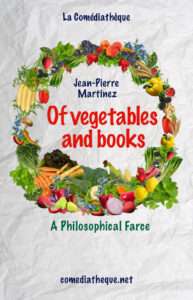Of Vegetables and Books, A Philosophical Farce by Jean-Pierre Martinez

The storefront of a grocery shop, which also serves as a bookstore, sets the stage for delightful exchanges between a philosophical grocer and his quirky customers, each in search of answers to their existential questions.
A philosophical farce that blends outrageous situations with reflections on the absurdity of life.
Original title in French : Primeurs, une farce philosophique
Translated by the author
Possible casting for 9 actors:
1M/8W, 2M/7W, 3M/6W, 4M/5W, 5M/4W, 6M/3W, 7M/2W, 8M/1W
Possible casting for 8 actors:
1M/7W, 2M/6W, 3M/5W, 4M/4W, 5M/3W, 6M/2W, 7M/1W
Play published online in January 2013
Play premiered at Château-Gontier, Le Rex, on April 1, 2020
Translation in Spanish by the author : Frutas y verduras, Farsa filosófica
Translation in Portuguese by the author : De legumes e livros, Farsa Filosófica
Analysis
The play Of Vegetables and Books is a philosophical farce blending absurd comedy, existential reflections, and outlandish situations. It takes place primarily in front of a small shop that doubles as a grocery store and a second-hand bookstore, run by Socrates, a grocer-philosopher with a knack for delivering witty and wise retorts.
In this quirky universe, where everything serves as a pretext for exploring big ideas, colorful characters cross paths and engage in dialogues mixing lightness and depth:
– Josie, an eccentric customer, questions the mysteries of existence while handling bananas and books. Declared dead after an absurd accident involving machinery, she returns from the dead, sparking reflections on fate and resilience.
– Ève, an unknown poet, desperately searches for a copy of her poetry collection Orphan Rhymes, lost during the sinking of her houseboat. Her quest turns into a romantic encounter as she charms Alban, a sensitive reader, over a shared melon.
– Sanchez, a caricatural commissioner, investigates an improbable case: the plagiarism of the entire universe. Between unicorn herds and suspicions about Socrates’ hallucinogenic mushrooms, he eventually reveals that everything is just an elaborate charade.
The play satirically tackles a variety of themes:
– Philosophy: The dialogues, laced with irony, playfully mock grand philosophical concepts, especially the search for meaning, with questions such as, “Why is there something rather than nothing?”
– Society and its absurdities: Through bizarre situations and grotesque characters, the play critiques the police, institutions, and social norms.
– Love and the human condition: Human relationships, no matter how absurd, highlight our universal desire for connection and recognition.
– Fate and illusion: By humorously addressing the theme of the universe as a counterfeit, the play invites us to question what is true or false in our perceptions.
The play concludes with a metatheatrical twist: Socrates reveals that neither he nor Sanchez are who they claim to be, emphasizing that everything—dialogues and characters included—is a game of deception. Socrates’ final line about the throwing of tomatoes encapsulates the spirit of Of Vegetables and Books: behind the absurdity lies a biting yet joyful critique of the human condition.
Of Vegetables and Books is a work where humor and existential reflections intertwine with finesse. Each line, brimming with double meanings, invites laughter while questioning the absurdities of our world.
